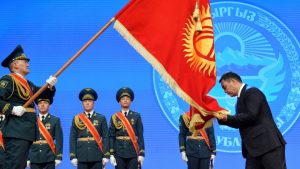Nearly 80 percent of those who voted in the April 11 referendum in Kyrgyzstan approved the new constitution promoted by President Sadyr Japarov, according to preliminary results. Those results, however, also indicate that turnout was a dismal 36.7 percent.
Speaking ahead of the vote on April 9 during an event hosted by the Carnegie Endowment for International Peace, the direct of RFE/RL’s Kyrgyz Service, Venera Djumataeva, noted that in less than 30 years Kyrgyzstan has had six presidents and 34 prime ministers. “But changing presidents and prime ministers is not enough,” she continued. “We in Kyrgyzstan also change constitutions fairly often.”
“Change does not always mean progressive steps,” she commented. Djumataeva said that the advent of a parliamentary system after the 2010 revolution was a big step, but one undercut by corruption. With parliament and the Kyrgyz government paralyzed, the problems faced by Kyrgyz went unaddressed and apathy deepened.
Then the fiasco in October 2020: An election seen as rigged by the powers-that-be set off a new cycle of political turmoil. Out of that churning rose Sadyr Japarov, from prisoner to president.
As Georgy Mamedov wrote for openDemocracy in January, just ahead of the presidential election and first referendum, “In the aftermath of October’s election, Japarov skillfully manipulated people’s rage against the political elites largely associated with a parliament marred by corruption and scandals.”
Put another way, by Djumataeva: “It is very easy now… to convince people that a strongman or powerful president can fix all problems and improve their lives and bring economic stability and prosperity.”
Kyrgyz voters elected Japarov in January and now, in April, have approved his preferred constitution. The new constitution re-centers the president, downgrades the parliament, and heightens the power of vague terms like the “public conscience of the people” in potentially restricting rights.
If Sunday’s turnout, in the final count, remains above 30 percent the referendum will be considered valid. But, as Dr. Saniia Toktogazieva, an associate professor and coordinator of the Human Rights program at the American University of Central Asia in Bishkek, noted in the same Carnegie event, the whole process has been of dubious legitimacy. Toktogazieva highlighted procedural violations, which undercut the legitimacy of the entire referendum process. Pointing to opinion issued by the Venice Commission (in response to a request from the Kyrgyz Constitutional Court), Toktogazieva pointed out that the Kyrgyz parliament, when it ushered through this referendum process, was already far past its mandate, which was to expire in October 2020. The whole process, she said, was illegitimate.
This notion was challenged by Edil Baisalov, Kyrgyzstan’s ambassador to the U.K., who remarked that previous constitutional changes were seen through by similarly murky processes. The 2010 constitution, which Toktogazieva argued Kyrgyzstan must hold to procedurally, was approved by an interim government (in which Baisalov served) under extraordinary circumstances after the ouster of Kurmanbek Bakiyev.
To this Toktogazieva replied: “Unfortunately, I think the argument brought by Ambassador Baisalov really resembles what we know as tu quoque, the interim government did it, why can’t we do it? And that is the problem of Kyrgyzstan. Every single constitutional referendum starting with Akayev, then Bakiyev and the rest has been done with gross procedural violations.” It’s not that the 2010 constitution is a “holy cow,” Toktogazieva said, but that the rule of law has been consistently trampled, every president tinkering via referendums with the constitution.
Baisalov, in his remarks, echoed the Kyrgyz government’s arguments in favor of changing the constitution, pointing out that no one disagrees on the core point that Kyrgyz are unhappy with the state of affairs in the country. “[The 2010] constitution did not work, did not deliver,” he said. “It is our greatest and my personal disappointment that this Kyrgyz dream of building parliamentary democracy… it was proven that we are not ready for this.”
Baisalov said Japarov was using his strong mandate to build a system Kyrgyz people want.
How strong Japarov’s mandate is may be a matter of perspective, though the disappointment of Kyrgyz in their governments to date is irrefutable. Although Japarov was elected in January by a large margin, vis-a-vis other candidates, turnout was just below 40 percent.
Djumataeva summed up the situation just ahead of the April 11 vote thusly, predicting (correctly) low turnout on the back of political apathy: “Many, many people are very disappointed. They feel political apathy or indifference, which could result in a record low turnout.”
The indifference of many and the votes of some have ushered in Kyrgyzstan’s next political phase: a return to a strong president and high hopes that a firm hand can correct the country’s course.
In its latest survey of Kyrgyz opinions, the International Republican Institute (IRI) found that 70 percent of those surveyed (between February 21 and March 5) believed Kyrgyzstan was headed in the right direction, a massive leap from just 41 percent who said the same in August 2020. When it comes to the problems Kyrgyz face, the top responses were unemployment, corruption, and high cost of living/high prices. Japarov’s mandate, whether one believes it strong or not, is to tackle those issues.

































